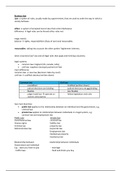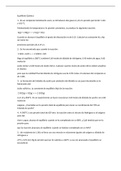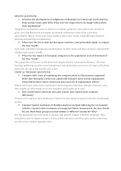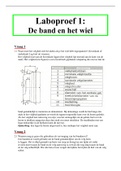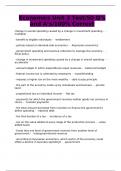Business law
Law: a system of rules, usually made by a government, that are used to order the way in which a
society behaves.
ethics: a system of accepted moral rules that control behaviour.
difference → legal rules can be forced ethics rules not
magic words:
balance → rights, responsibilities (Duty of care) and reasonables.
reasonables: taking into account the other parties’ legitement interests.
what is business law? any and all legal rules that apply and forming a business.
legal systems:
• common law: England (US, canada, india)
• civil law: napoleon (europe) pushed civil law
main difference:
common law → case law (decisions takes by court)
civil law → codified statutes (written down)
Common law Civil law
- uncodified - Codified (written down)
- judicial decisions are binding - judicial decisions are not binding
- flexible - less flexible
- judge made law → operate on - follow legislation and rules
custom and practice
two main branches:
• public law applies to the relationship between an individual and the government, e.g.
criminal law.
• private law applies to relationships between individuals in a legal system, e.g.
contract law and employment law
Public Law private law
Constitutional law contract law
Human rights liability law
Criminal law property law
Administrative law corporate law
Employment law
Intellectual property
Insolvency law
Relationship between relationship between individuals
Government and individual
e.g. - taxes you have to pay - marriage
- traffic laws - food and drinks you buy
, damages = financial composition
international law
treaties (Verdrag) contracts between states and international organisations.
conventions
EU law
Regulations = legal act of the EU
Directives = certain results that must be achieved
Difference →
Regulations Directives
- binding on all member states and - binding on all member states and people
people within the EU within the EU
- common goal defined - goal defined
- determined how to achieve the - each member state may decide how to
goal achieve the set goal and what national laws
are needed to do so.
EU law
The four freedoms? (movement of goods, people, services and capital over borders)
- Goods
- People
- Services
- Capital
CISG = united nations convention on Contracts for the International Sale of Goods (= vienna
convention) → an international agreement regulating treaties between states.
What is it?
A set of uniform rules:
- Defining the obligations of proffesional, commercial buyers and sellers from different
contracting states, either within or outside the EU, regarding certain commercial goods and
products that apply automatically, unless their applicability is explicity excluded in the sales
market
B2C sales within EU → consumer rights directive
B2B sales within and outside EU → CISG
Workshop 1
the 3 R´s of law?
• right
• responsibilities (duty of care)
• reasonables (taking into account the other parties legitement interests) (rekening houden)
purpose of law?
control of regulate behaviour
common-law countries: british colonies and the united states
civil-law countries: Europe, Russia, south Amercia + mexico (french, dutch, german, spanish or
portuguese colonies + south america + mexico + eastern european and east asian countries)
Law: a system of rules, usually made by a government, that are used to order the way in which a
society behaves.
ethics: a system of accepted moral rules that control behaviour.
difference → legal rules can be forced ethics rules not
magic words:
balance → rights, responsibilities (Duty of care) and reasonables.
reasonables: taking into account the other parties’ legitement interests.
what is business law? any and all legal rules that apply and forming a business.
legal systems:
• common law: England (US, canada, india)
• civil law: napoleon (europe) pushed civil law
main difference:
common law → case law (decisions takes by court)
civil law → codified statutes (written down)
Common law Civil law
- uncodified - Codified (written down)
- judicial decisions are binding - judicial decisions are not binding
- flexible - less flexible
- judge made law → operate on - follow legislation and rules
custom and practice
two main branches:
• public law applies to the relationship between an individual and the government, e.g.
criminal law.
• private law applies to relationships between individuals in a legal system, e.g.
contract law and employment law
Public Law private law
Constitutional law contract law
Human rights liability law
Criminal law property law
Administrative law corporate law
Employment law
Intellectual property
Insolvency law
Relationship between relationship between individuals
Government and individual
e.g. - taxes you have to pay - marriage
- traffic laws - food and drinks you buy
, damages = financial composition
international law
treaties (Verdrag) contracts between states and international organisations.
conventions
EU law
Regulations = legal act of the EU
Directives = certain results that must be achieved
Difference →
Regulations Directives
- binding on all member states and - binding on all member states and people
people within the EU within the EU
- common goal defined - goal defined
- determined how to achieve the - each member state may decide how to
goal achieve the set goal and what national laws
are needed to do so.
EU law
The four freedoms? (movement of goods, people, services and capital over borders)
- Goods
- People
- Services
- Capital
CISG = united nations convention on Contracts for the International Sale of Goods (= vienna
convention) → an international agreement regulating treaties between states.
What is it?
A set of uniform rules:
- Defining the obligations of proffesional, commercial buyers and sellers from different
contracting states, either within or outside the EU, regarding certain commercial goods and
products that apply automatically, unless their applicability is explicity excluded in the sales
market
B2C sales within EU → consumer rights directive
B2B sales within and outside EU → CISG
Workshop 1
the 3 R´s of law?
• right
• responsibilities (duty of care)
• reasonables (taking into account the other parties legitement interests) (rekening houden)
purpose of law?
control of regulate behaviour
common-law countries: british colonies and the united states
civil-law countries: Europe, Russia, south Amercia + mexico (french, dutch, german, spanish or
portuguese colonies + south america + mexico + eastern european and east asian countries)

